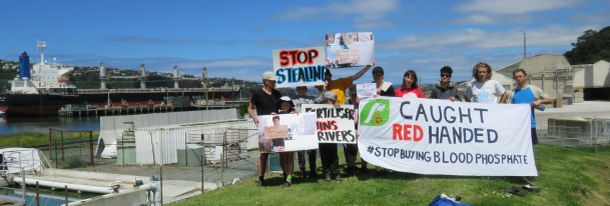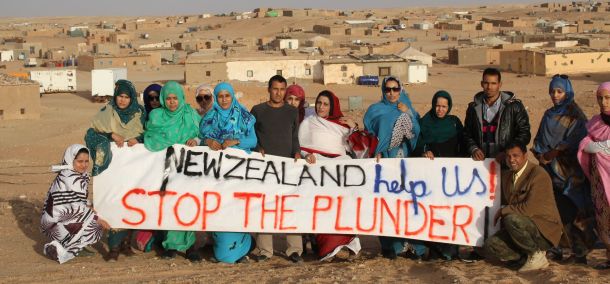
The Press and www.stuff.co.nz
30 July 2007
We'd be right about the geography, but less so about the connection to New Zealand. In fact, about 80 per cent of the phosphate that fertilises New Zealand farms comes from this far-flung part of the world. When supplies of this mineral from the Pacific Island of Nauru were exhausted, that island was abandoned and forgotten by the companies and countries which exploited it. New Zealand had to look further afield and Western Sahara is now our main supplier of phosphate.
Bulk carriers regularly visit ports such as Tauranga, Napier and Port Chalmers with loads carried from Western Sahara, but with the shipments labelled as coming from neighbouring Morocco.
But there is a problem. The Saharawi people are under military occupation by Morocco and strongly opposed to the exploitation of their resources. By allowing these imports our Government is guilty of receiving stolen goods.
Direct appeals have been made to New Zealand to stop these imports, but they have fallen on deaf ears. The latest appeal has come from Malainan Lakhal, a Saharawi journalist who has been in New Zealand over the past week to seek support for the independence of Western Sahara.
The story of the Saharawi people is a typical story of African colonisation. The region was invaded and claimed by Spain in 1884, and when African countries began to gain independence, beginning with neighbouring West African country of Ghana in 1959, the people of Western Sahara organised for their freedom. However, the territory today is still a colony - in fact, the last remaining colony on the continent.
Western Sahara was put on the United Nations decolonisation register in 1963. In 1975 Spain left but instead of an independence referendum Morocco and Mauritania invaded. In the war which followed, Mauritania withdrew but Morocco remained and took control. The independence movement was brutally suppressed. Refugees fled
the country and many are now living in camps in south-west Algeria.
Inside Western Sahara today, 120,000 Moroccan troops maintain the illegal ccupation. Such is the value of Western Sahara's mineral resources that the military occupiers have built a wall, an unbelievable 2700km long, to keep control and prevent "insurgents" entering the country. The Great Wall of China, Hadrian's wall and the Berlin wall may be consigned to history but like the apartheid wall being built by Israel , this Moroccan-built wall has created an enormous open-air prison with all the brutal oppression needed to maintain it.
Morocco does this on behalf of the large companies which exploit minerals such as phosphate that rightly belong to the local people, whose independence movement is a full member of the African Union, is recognised by more than 80 countries and has observer status at the United Nations.
What the local people want is a referendum on independence, but attempts to organise this by the UN have been thwarted by Morocco, with support from Western governments and large corporations which are enjoying the income from the plunder of Saharawi minerals.
So where does New Zealand stand? In Parliament last year, Green Party MP Metiria Turei questioned our Trade Minister Phil Goff. He made a fine statement saying, " New Zealand has grave concerns about the political situation in Western Sahara and has strongly supported UN processes and the peace plan designed to resolve the dispute between the government of Morocco and the Saharawi people".
He also acknowledged the legal advice the UN has received, that exploitation of Western Saharan minerals without the support of the local people, is contrary to the principles of international law and that the interests of the inhabitants of non-self-governing territories must be paramount.
But then he went on to say the Government would allow the imports because he did not believe they were specifically prohibited under international law.
So, while the Government agrees it is illegal to mine and export the phosphate, it claims it is not illegal to import it into New Zealand.
It's like the guy in the pub who buys a cheap TV knowing it's been stolen. A cynical, expedient policy.
The struggle in Western Sahara has no profile in New Zealand but it should because we are part of the problem.
It's an issue where a small country such as New Zealand could make a welcome stand on behalf of human rights and democracy.
Copyright Fairfax Media 2007, reproduced courtesy of The Press and www.stuff.co.nz.
These are the clients of Morocco’s phosphate plunder
For the eleventh year in a row, Western Sahara Resource Watch publishes a detailed, annual overview of the companies involved in the purchase of conflict phosphates from occupied Western Sahara.
Protest in New Zealand against conflict mineral imports
From the end of this year, 2 of 3 global importers of Western Sahara's controversial conflict minerals are from New Zealand. This week, locals protested in the city of Dunedin.
The New Zealand phosphate controversy
The two New Zealand companies Ravensdown and Ballance Agri-Nutrients, now the only two clients of phosphate rock from occupied Western Sahara in the world, are defending their purchases on social media. Here is what is wrong with what they claim.
NZ fertiliser importers defend their imports
The New Zealand Fertiliser Association, representing the controversial importing companies in New Zealand is quoted by national TV that they are "aware of what's happening in Western Sahara but that's no reason not to use phosphate rock from the area".


